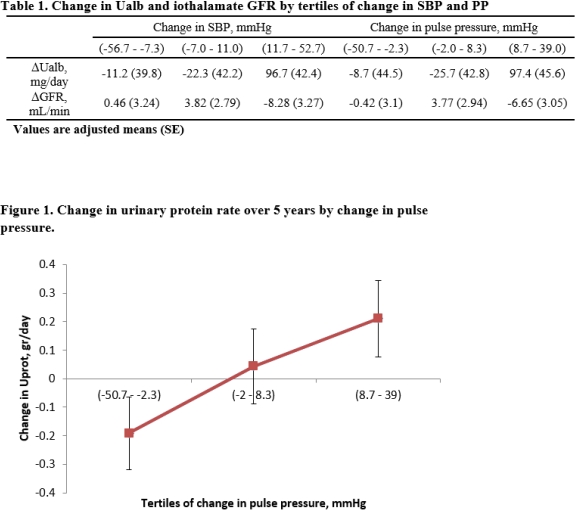Pulse Pressure and GFR Decay in Kidney Transplant Recipients.
U of MN, Mpls.
Meeting: 2016 American Transplant Congress
Abstract number: 60
Keywords: Glomerular filtration rate (GFR), Kidney transplantation, Proteinuria
Session Information
Session Name: Concurrent Session: Novel Markers of Long Term Kidney Transplant Outcomes
Session Type: Concurrent Session
Date: Sunday, June 12, 2016
Session Time: 2:30pm-4:00pm
 Presentation Time: 3:30pm-3:42pm
Presentation Time: 3:30pm-3:42pm
Location: Ballroom A
Single blood pressure values have commonly been used to assess the risk of allograft failure in kidney transplant recipients. In this analysis we prospectively evaluated the association between change in systolic and diastolic blood pressure (SBP, DBP) and pulse pressure (PP) on albuminuria and iothalamate GFR change.
Methods: This is a post-hoc analysis of the 154 kidney transplant recipients who participated in the NIH sponsored ABCAN trial which randomized patients to losartan (100 mg daily) vs. placebo shortly after transplantation for 5 years. Subjects underwent annual iothalamate GFR and allograft biopsy at study entry and exit. Blood pressure was measured following strict guidelines at each annual visit. The primary endpoint of the trial was doubling of cortical interstitium volume expansion from baseline to 5 years or ESRD from IF/TA. The main result showed a modest protective effect with losartan (p = 0.08). The clinical trial data reported no difference in blood pressures between the treatment groups and because of this, were pooled.
Linear regression analysis adjusting for age, sex, race, baseline SBP, DBP and hypertension status was performed to test the association between change (year 5 – baseline) in SBP, DBP and PP and the dependent variables change in urinary albumin (Ualb) and GFR.
Results: The sample consisted of 65% males, age of 51.3±11 years, mostly White and hypertensives (65.5%). Mean change in SBP and DBP were of 1.23±20.4 and -1.62±11.3 mmHg during the 5 year period. Increases in SBP and PP > 11.7 and 8.7 mmHg, respectively, over a 5 year period were associated with an increase in Ualb and a faster decline in GFR than those with no change or a decrease in SBP and PP. The change in pulse pressure was positively associated with change in urinary protein, p < 0.05 (Figure 1).
Conclusion: Change in SBP and PP, but not diastolic blood pressure, are associated with proteinuria and a faster decline in measured GFR. Trials addressing optimal BP in the setting of kidney transplantation are needed.

CITATION INFORMATION: Sanchez O, Reule S, Spong R, Issa N, Kukla A, Matas A, Ibrahim H. Pulse Pressure and GFR Decay in Kidney Transplant Recipients. Am J Transplant. 2016;16 (suppl 3).
To cite this abstract in AMA style:
Sanchez O, Reule S, Spong R, Issa N, Kukla A, Matas A, Ibrahim H. Pulse Pressure and GFR Decay in Kidney Transplant Recipients. [abstract]. Am J Transplant. 2016; 16 (suppl 3). https://atcmeetingabstracts.com/abstract/pulse-pressure-and-gfr-decay-in-kidney-transplant-recipients/. Accessed February 27, 2026.« Back to 2016 American Transplant Congress
